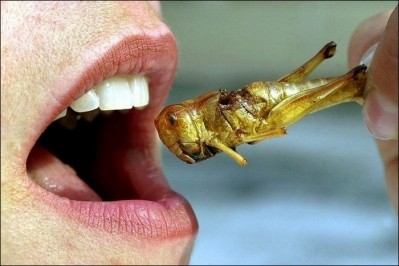Insects and food pyramids could help reduce meat consumption

The shift towards a more sustainable diet “necessitates less reliance on foods of animal origin”, according to the study called: “Can we cut out the meat of the dish? Constructing consumer-oriented pathways towards meat substitution”.
But to create an effective dietary change, the researchers from the Institute for Environmental Studies, VU University, Amsterdam, said “new practices must be to some degree congruent with the rest of the behaviour of the consumer”.
The study, published in the journal Appetite, suggests four policy-relevant pathways for a transition towards a more plant-based diet.
The first is incremental change towards more health-conscious vegetarian meals, such as using fish, eggs and cheese, as an intermediate shift from routinized meat eating.
The second is utilizing the trend towards convenience, such as combining unfamiliar with existing foods.
Such consumers “may not be too bothered by the idea of consuming insects since they disappear as an ingredient in the processed product and the product remains familiar on the surface”, according to the authors.
The third is reducing portion size and simply eating small amounts of meat
The fourth is a practice-oriented change towards vegetarian meals, challenging existing meal formats and conventions.
The authors conclude that further research should address how these can be supported by policymakers in industry and government to promote changes in a sustainable direction.
For example, changing food guide pyramids to include sources of plant protein - like pulses, nuts and whole wheat - with proteins of animal origin, instead of grouping them with breads, pasta and other sources of carbohydrates.
Consumer survey
The study looked at consumer meat consumption along with attitudes towards various substitution options before identifying ways forward.
Using the results of a questionnaire in the Netherlands, the researchers showed that with regard to a main meal, participants reported an average of 5.4 meat days per week.
They found that consumer level of involvement in food could be separated into taste-oriented and reflection-oriented motivational goals.
Taste orientation includes the cultivation of an adventurous taste and such consumers might find plant-based meals attractive, as well as insects.
Reflection-oriented consumers consider the wider implications of food choices in terms of health, naturalness, weight control and ethical considerations. They might prefer plant-based proteins and relatively small portions of meat.
Age differences were seen with older people depend on the component structure of meals. However new meal patterns are developing among the younger generation that could “reduce the special status of meat and make substitution easier”.
Insects
Meanwhile, the UK’s food safety agency indicated last year that purified or partially purified insect protein could become commercial viable if a reliable source could be identified.
It is estimated that 2.5 billion people worldwide have diets that routinely include insects.
Source: Appetite
Authors: Hanna Schösler, Joop de Boer, Jan J. Boersema
Title: “Can we cut out the meat of the dish? Constructing consumer-oriented pathways towards meat substitution”.
doi:10.1016/j.appet.2011.09.009


















